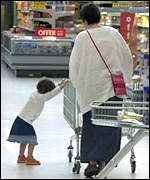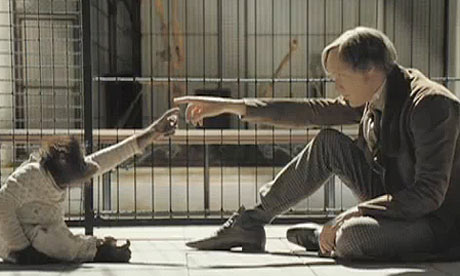 I hate supermarkets; they sap my soul.
I hate supermarkets; they sap my soul.There is so much stuff – so many varieties of things we don’t need in packages that we will just take home and throw away. We are faced with a plethora of options but no real choice. How many cereals can one person handle? I find myself standing in front of them staring at the multiple versions of maize and my eyes glaze over.
It starts with the vegetables. There are simply too many and they are all evenly spaced and displayed in colourful regimented mounds that seem plastic in their uniformity. And it’s so cold that I lose the circulation in my hands, while my mind loses the will to live.
 The music is vile, and the forced jollity of the announcements telling me what’s on special in aisle four makes me want to cry at the thought that the real world is out there somewhere, but it’s not in here. What’s in here is bored-out-of-their mind women pushing trolleys and pandering to their brattish offspring.
The music is vile, and the forced jollity of the announcements telling me what’s on special in aisle four makes me want to cry at the thought that the real world is out there somewhere, but it’s not in here. What’s in here is bored-out-of-their mind women pushing trolleys and pandering to their brattish offspring.It’s one of the domestic chores I like least, right up there with cleaning the toilet. And yet, I love a farmer’s market.
Here there is something seductive about the produce on offer. Even the names are alluring; the pale and fragrant lemon cheese; the still-warm vine-ripened tomatoes; the personally-pressed virgin oil; earthy new potatoes; regal purple aubergines; spiky but soft artichoke hearts. Some people believe that any list can be poetry if the right words are used, but that’s another matter.
 I’m currently reading the brilliant Eating for England by Nigel Slater. He writes of the farmer’s market; “I shop there because I want to meet the people who grow what I eat, to experience the joy of seasonal shopping, to be as close as I can to where my food originates without actually getting my hands in the soil. And I suspect that, as I trundle up the hill with my recycled bag of cheap corn on the cob still in its fresh green husks and a swaying bunch of three-foot-high sunflowers, it probably allows me to feel just a wee bit smug about those shoppers with their supermarket packet of identically sized, overpriced, cellophane-wrapped green beans from Mozambique.”
I’m currently reading the brilliant Eating for England by Nigel Slater. He writes of the farmer’s market; “I shop there because I want to meet the people who grow what I eat, to experience the joy of seasonal shopping, to be as close as I can to where my food originates without actually getting my hands in the soil. And I suspect that, as I trundle up the hill with my recycled bag of cheap corn on the cob still in its fresh green husks and a swaying bunch of three-foot-high sunflowers, it probably allows me to feel just a wee bit smug about those shoppers with their supermarket packet of identically sized, overpriced, cellophane-wrapped green beans from Mozambique.”When I was a student, I used to go to different shops to collect my groceries. There was a herbalist, a greengrocer, a fishmonger, a delicatessen (I couldn’t afford anything from there), a butcher, a baker and yes, even a candlestick maker (and I was going through that late teen/early twenties obsession with smelly incense and cinnamon and spiced pumpkin candles).

Things were cheaper, and I could talk to the people who sold them. Sure, it took all day to collect my bits and pieces wrapped in waxed paper but that was okay, because I had all day – I was inevitably procrastinating about writing an essay on eighteenth century English drama.
Now it’s far more convenient to drive to one soulless sterile building with blinding bright lights and no heart. (To be fair, when Big Fresh in Christchurch introduced singing vegetables to the greengrocery section it was truly terrifying).
And yet, some people like it. As I returned a trolley to its berth (is that what they call them? They should) a bloke smiled happily, “I love the supermarket; it’s full of hot women. I’m going to come here every day.” And there you have it; it may not be a bustling bazaar or a social souk, but it can be considered a meat market.

 He questions the rational of a vindictive divinity. Thousands die that only a few may live – what sort of a plan is that? Innes can only answer, “It is not my duty to speculate on the will of God.” Just as there are no atheists in the trenches, Darwin postpones publishing because, although he has proved the triumph of science, he is still afraid to risk his mortal soul. When his daughter’s life hangs in the balance (it is to be supposed that she died from scarlet fever), he is prepared to bargain with God; if you let my child live...
He questions the rational of a vindictive divinity. Thousands die that only a few may live – what sort of a plan is that? Innes can only answer, “It is not my duty to speculate on the will of God.” Just as there are no atheists in the trenches, Darwin postpones publishing because, although he has proved the triumph of science, he is still afraid to risk his mortal soul. When his daughter’s life hangs in the balance (it is to be supposed that she died from scarlet fever), he is prepared to bargain with God; if you let my child live...

 Great cinematography abounds from the opening credits (cells; sperm; fish; birds; butterflies; wildebeest) to the sped-up cycle of life and the seasonal changes depicting passage of time. The English countryside is stunning with its woodland mammals and rock pool inhabitants. Nature is instructive and it is also a battlefield. In a scene straight out of a BBC documentary, a fox catches a rabbit much to the dismay of the youngest Darwin girl. The moral is left to Annie to explain, “The fox has to eat the rabbit or its babies will die – that’s the balance of things.”
Great cinematography abounds from the opening credits (cells; sperm; fish; birds; butterflies; wildebeest) to the sped-up cycle of life and the seasonal changes depicting passage of time. The English countryside is stunning with its woodland mammals and rock pool inhabitants. Nature is instructive and it is also a battlefield. In a scene straight out of a BBC documentary, a fox catches a rabbit much to the dismay of the youngest Darwin girl. The moral is left to Annie to explain, “The fox has to eat the rabbit or its babies will die – that’s the balance of things.”
